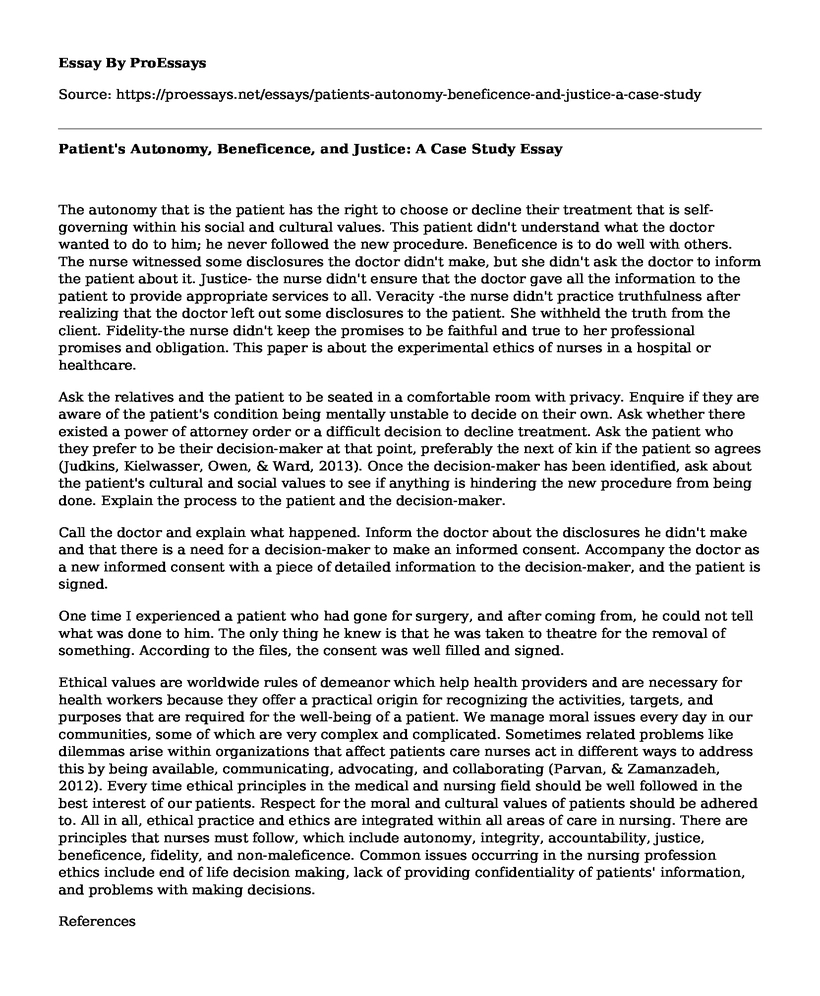The autonomy that is the patient has the right to choose or decline their treatment that is self-governing within his social and cultural values. This patient didn't understand what the doctor wanted to do to him; he never followed the new procedure. Beneficence is to do well with others. The nurse witnessed some disclosures the doctor didn't make, but she didn't ask the doctor to inform the patient about it. Justice- the nurse didn't ensure that the doctor gave all the information to the patient to provide appropriate services to all. Veracity -the nurse didn't practice truthfulness after realizing that the doctor left out some disclosures to the patient. She withheld the truth from the client. Fidelity-the nurse didn't keep the promises to be faithful and true to her professional promises and obligation. This paper is about the experimental ethics of nurses in a hospital or healthcare.
Ask the relatives and the patient to be seated in a comfortable room with privacy. Enquire if they are aware of the patient's condition being mentally unstable to decide on their own. Ask whether there existed a power of attorney order or a difficult decision to decline treatment. Ask the patient who they prefer to be their decision-maker at that point, preferably the next of kin if the patient so agrees (Judkins, Kielwasser, Owen, & Ward, 2013). Once the decision-maker has been identified, ask about the patient's cultural and social values to see if anything is hindering the new procedure from being done. Explain the process to the patient and the decision-maker.
Call the doctor and explain what happened. Inform the doctor about the disclosures he didn't make and that there is a need for a decision-maker to make an informed consent. Accompany the doctor as a new informed consent with a piece of detailed information to the decision-maker, and the patient is signed.
One time I experienced a patient who had gone for surgery, and after coming from, he could not tell what was done to him. The only thing he knew is that he was taken to theatre for the removal of something. According to the files, the consent was well filled and signed.
Ethical values are worldwide rules of demeanor which help health providers and are necessary for health workers because they offer a practical origin for recognizing the activities, targets, and purposes that are required for the well-being of a patient. We manage moral issues every day in our communities, some of which are very complex and complicated. Sometimes related problems like dilemmas arise within organizations that affect patients care nurses act in different ways to address this by being available, communicating, advocating, and collaborating (Parvan, & Zamanzadeh, 2012). Every time ethical principles in the medical and nursing field should be well followed in the best interest of our patients. Respect for the moral and cultural values of patients should be adhered to. All in all, ethical practice and ethics are integrated within all areas of care in nursing. There are principles that nurses must follow, which include autonomy, integrity, accountability, justice, beneficence, fidelity, and non-maleficence. Common issues occurring in the nursing profession ethics include end of life decision making, lack of providing confidentiality of patients' information, and problems with making decisions.
References
Parvan, K., & Zamanzadeh, V. (2012). Professional values of the nursing students' perspective in type 1 universities of medical sciences. Quarterly Journal of Nursing Management, 1(1), 69-82. Retrieved from http://www.ijnv.ir/browse.php?a_id=80&sid=1&slc_lang=en
Judkins-Cohn, T. M., Kielwasser-Withrow, K., Owen, M., & Ward, J. (2013). Ethical principles of informed consent: Exploring nurses' dual role of care provider and researcher. The Journal of Continuing Education in Nursing, 45(1), 35-42. Retrieved from https://www.healio.com/nursing/journals/jcen/2014-1-45-1/%7B5262a764-6bfa-4198-8e82-1ccd066272b2%7D/ethical-principles-of-informed-consent-exploring-nurses-dual-role-of-care-provider-and-researcher
Cite this page
Patient's Autonomy, Beneficence, and Justice: A Case Study. (2023, Mar 12). Retrieved from https://proessays.net/essays/patients-autonomy-beneficence-and-justice-a-case-study
If you are the original author of this essay and no longer wish to have it published on the ProEssays website, please click below to request its removal:
- Nursing Transition Paper
- Concept Analysis of Pain - Research Paper
- Essay Sample on Managing Diabetes: The Risk of Complications & Types of Diabetes
- Nivolumab: An Effective First Line of Defense for Cancer Treatment - Essay Sample
- Nursing Care Philosophy Essay Example
- Transforming US Healthcare: 4 Areas of Nursing Practice - Research Paper
- Essay Sample on Christiaan Barnard: World's First Human-to-Human Heart Transplant Pioneer







